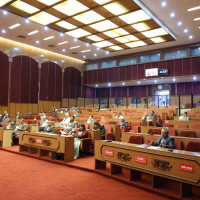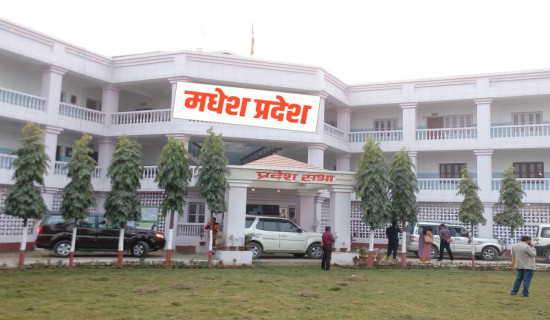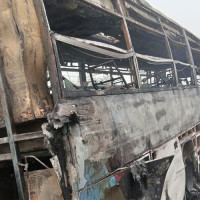- Thursday, 12 February 2026
Nepali medical students in dismay after returning home from restive Bangladesh
By Nayak Paudel,Kathmandu, Aug. 9: Hundreds of Nepali students pursuing MBBS in Bangladesh are now left in dismay due to concerns related to their future following the ongoing unrest there.
Around 200 MBBS students have returned to Nepal since the protest of students against the reservation system turned violent. The situation has not returned to normalcy even after Prime Minister Sheikh Hasina resigned and fled the country on August 5.
“Many Nepali students are still in Bangladesh. Although it was expected that the scenario in Bangladesh would become normal after Sheikh Hasina’s departure, it has not been so. The attacks on Hindus and vandalisation of hospitals and medical colleges owned by Hasina-affiliated Awami League leaders and friends have heightened risks for Nepali students there,” said Navin Yadav, President of the Nepalese Medical Students’ Association in Bangladesh.
While the unrest has led to the halt of classes and internships in Bangladesh, Nepali students studying there are worried whether the halted course will resume and they can complete their internships in time.
As per the National Guidelines for Medical Internship Training-2007 issued by the Nepal Medical Council (NMC), Nepali students should study MBBS/BDS in medical colleges providing a year-long internship after a minimum of 4.5 years of academics.
A group of Bangladesh-returned Nepali medical students, including Yadav, have been visiting ministries, leaders and senior doctors to pave the way to complete their remaining internship period in Nepal and ensure safety of those who are still studying.
“I had completed four months of the year-long mandatory internship in Bangladesh before I returned to Nepal. I have to complete the remaining eight months of the internship soon to begin other processes towards becoming a registered doctor, but it does not seem possible by returning to Bangladesh,” said Yadav. Many like Yadav have left their one-year internship in the middle. More Nepali students are currently studying MBBS/BDS in Bangladesh.
“We do not know when the situation in Bangladesh will be normal. The students are in stress as they do not want to let their years of study go to waste. As Bangladesh is in a problem of its own, we believe that our government will help us as we went abroad after seeking permission,” said Yadav.
The group of students has submitted memorandums and statements to the Minister for Education, Science and Technology and the Minister for Health and Population. They have also visited the Ministry of Foreign Affairs and their concern has already reached the Prime Minister.
“Nevertheless, no concrete steps have been taken yet,” Yadav said.
After meeting with the group of Nepali students on Wednesday, Nepal’s senior obstetrician and gynaecologist Dr. Bhola Rijal posted on his Facebook, “Since I also pursued my medical education from Bangladesh, I understand the problem of these students closely. It is necessary to take steps to solve internship and other problems of the students at the earliest.”
When several Nepali medical students returned home from China during the COVID-19 pandemic without completing their internship, the Medical Education Commission (MEC), in July 2021, paved the way for the students to complete their remaining internship in Nepal.
“Students from Bangladesh also seek a similar response,” said Yadav.
Meanwhile, according to the concerned medical authorities of Nepal, they are yet to decide on Bangladesh’s case.
“We are waiting for a response on the matter from Nepal’s Ministry of Foreign Affairs. We have to ascertain that the students cannot complete their tasks in Bangladesh. Unless a decision arrives from the concerned department, we cannot start necessary procedures towards addressing the concern of the students,” said Prof. Dr. Anjani Kumar Jha, vice-chairperson of the MEC.
Nevertheless, while providing internships for the students will be easier for the authorities, responding to the problems of students who are midway in their academics would be difficult.
“It is not the fault of the students that they could not continue their internship and academics in Bangladesh; thus, Nepali authorities are bound to find a solution to their problem. The students have been arriving at the Council for permission to complete their internships in Nepal; however, we cannot decide on it before the state gives a proper response on the situation in Bangladesh,” said Dr. Satish Kumar Deo, Registrar and Spokesperson for the Nepal Medical Council.
The students have also demanded the government increase medical seats within the country. “We are forced to go abroad in search of medical education as there are not enough seats in Nepal. It affects the country economically as well. If we study within the country, we can study safely,” read the statement submitted by the students to different ministries.
















